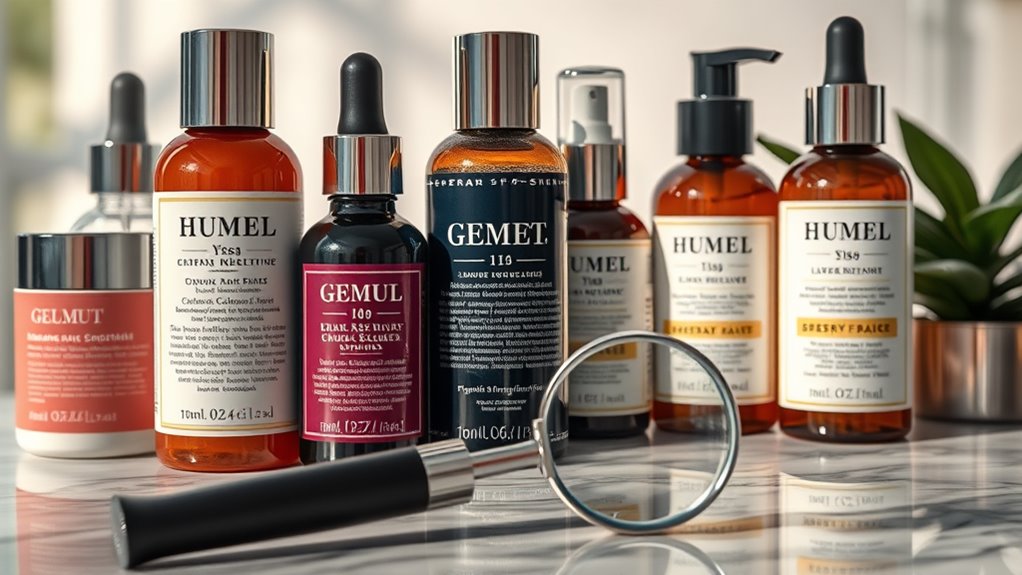Which Ingredients Are Worth the Hype. See What’s Backed by Science
You’ve got questions about which ingredients truly live up to the hype, backed by solid science. Vitamin C protects your skin from free radicals and boosts collagen, while hyaluronic acid hydrates it effectively, reducing wrinkles. Retinol smooths fine lines, omega-3s support your heart health, and probiotics balance your gut. These aren’t fads—they’re proven through clinical studies. You’ll uncover practical tips on incorporating them next.
Key Takeaways
- Vitamin C is scientifically backed for boosting collagen production and reducing hyperpigmentation in skin health studies.
- Hyaluronic acid has clinical evidence showing it increases skin hydration by up to 30%, making it effective for anti-aging.
- Retinol is supported by trials for reducing wrinkles and improving skin elasticity through enhanced cell renewal.
- Omega-3 fatty acids are proven in research to lower heart disease risk and reduce inflammation for better cardiovascular health.
- Probiotics demonstrate evidence from clinical studies in balancing gut microbiome and alleviating digestive inflammation.
The Science Behind Vitamin C
Because Vitamin C acts as a potent antioxidant, it plays a key role in protecting your cells from damage caused by free radicals. Additionally, it serves as a vital component in natural remedies for addressing skin concerns like dark spots.
In ingredient science, you benefit from its ability to boost collagen production, enhancing skin elasticity and wound healing.
Studies show it neutralizes oxidative stress, supporting immune function and reducing inflammation.
You can maximize its effects by incorporating stable forms like ascorbic acid into your routine, ensuring bioavailability through topical applications or diet.
This evidence-based approach makes Vitamin C a reliable, science-backed ingredient for daily health maintenance.
Furthermore, emerging research highlights Vitamin C’s efficacy in treating hyperpigmentation by inhibiting melanin production and promoting an even skin tone.
Evaluating Hyaluronic Acid’s Benefits
You’ve probably heard about hyaluronic acid‘s role in skincare, and it’s time you understand its key benefits based on scientific studies.
It actively boosts your skin’s hydration by drawing in moisture, which research shows can improve elasticity and plumpness.
Plus, you can leverage its anti-aging effects, as evidence indicates it reduces fine lines by supporting the skin’s natural repair processes.
Moreover, studies show that hyaluronic acid suits multiple skin types, making it a versatile ingredient for various needs.
Furthermore, hyaluronic acid serves as an instant solution for dry skin by effectively locking in moisture and promoting radiant results.
Hydration Benefits
Hyaluronic acid, a naturally occurring molecule in your skin, excels at drawing in and retaining moisture, making it a key player in combating dryness.
You benefit from its ability to hold up to 1,000 times its weight in water, as studies show it boosts skin hydration by 20-30% within hours.
In practical terms, apply it in serums or creams to restore your skin’s barrier, reducing flakiness and irritation.
For best results, use it twice daily on damp skin, backed by research in the Journal of Cosmetic Dermatology, ensuring long-lasting moisture without greasiness.
Anti-Aging Effects
Beyond its hydration prowess, hyaluronic acid tackles aging by restoring skin’s volume and elasticity, reducing fine lines and wrinkles through its ability to bind water and support collagen. You can see this in action as it boosts your skin’s barrier, minimizing environmental damage and promoting a firmer look. Studies show it enhances collagen synthesis, making it a practical choice for daily routines.
| Before Hyaluronic Acid | After Hyaluronic Acid |
|---|---|
| Fine lines visible | Lines plumped and less evident |
| Skin sagging | Firmer, more elastic texture |
| Dull, dry appearance | Radiant, hydrated glow |
| Wrinkles prominent | Reduced depth and visibility |
| Loss of volume | Restored fullness and youth |
Incorporate it into your regimen for science-backed results.
Retinol: Evidence and Effectiveness
While retinol often tops skincare recommendations, its effectiveness stems from robust clinical evidence showing it actively reduces wrinkles and acne by boosting collagen production and accelerating cell renewal. Similarly, for acne management, salicylic acid stands out as another science-backed option due to its exfoliating properties that help clear pores and reduce inflammation.
You can trust studies from the Journal of Investigative Dermatology, which demonstrate that regular use improves skin elasticity and texture.
Start with a 0.1-0.3% concentration to minimize irritation, applying it nightly on clean skin.
Pair it with sunscreen during the day, as it heightens sun sensitivity.
This evidence-based approach lets you achieve visible results without unnecessary hype.
Additionally, retinol enhances radiant skin by promoting an even complexion and overall vitality.
Probiotics in Wellness Products
Probiotics have gained attention for their role in supporting gut health, as clinical studies from journals like Nature Reviews Microbiology confirm they balance your microbiome and reduce inflammation.
You’ve seen them in supplements and fermented foods like yogurt. Research from the Lancet shows specific strains, such as Lactobacillus, can ease irritable bowel symptoms and strengthen your immune response.
For practical use, choose products with at least 1 billion CFUs and third-party verification. Start slowly, monitor effects, and consult your doctor to integrate them safely into your routine for evidence-based gut support.
Collagen’s Role in Skin Health
You notice how collagen supports your skin’s health through evidence-based benefits like boosting hydration, which research shows helps maintain a plump, moisturized barrier.
It actively improves your skin’s elasticity, as studies indicate that consistent intake firms up the structure and reduces sagging.
Additionally, consuming nutrient-rich foods can promote collagen production and protect against free radicals to maintain skin elasticity.
[LIST OF 3 SUBHEADING DISCUSSION POINTS IN ENGLISH
Collagen forms the foundation of skin health, supporting elasticity and firmness that diminish with age. You produce less of it over time, leading to wrinkles, but science shows collagen peptides can help restore structure. Studies confirm its benefits for anti-aging and wound healing.
| Aspect | Scientific Backing | Practical Tip |
|---|---|---|
| Elasticity | Research in JAMA Dermatology shows increased skin elasticity after supplementation. | Add bone broth to your diet daily. |
| Firmness | Clinical trials indicate reduced fine lines with hydrolyzed collagen. | Use a collagen serum in your routine. |
| Wound Healing | Evidence from British Journal of Dermatology supports faster recovery. | Combine with vitamin C for better absorption. |
| Anti-Aging | Meta-analyses link collagen to improved skin density. | Opt for marine-sourced supplements. |
| Structural Support | Studies demonstrate enhanced dermal matrix. | Monitor intake via food sources like fish. |
Boosts Skin Hydration
Beyond its structural benefits, hydration in the skin relies on collagen to retain moisture and prevent dryness.
As a key protein, collagen forms a network that binds water molecules, enhancing your skin’s barrier function and reducing water loss, as evidenced by clinical studies.
For instance, research in the Journal of Drugs in Dermatology shows oral collagen supplements increase skin hydration by up to 28% in four weeks.
You can boost this naturally by adding collagen-rich foods like fish or supplements to your diet, leading to plumper, less flaky skin.
This practical, science-backed strategy keeps your complexion hydrated effectively.
Improves Skin Elasticity
Skin elasticity thrives on collagen’s ability to form a resilient framework that supports the skin’s firmness and bounce-back. As you age, declining collagen leads to sagging, but evidence from studies, like those in the Journal of Cosmetic Dermatology, shows supplements can boost elasticity by up to 20% in eight weeks. You’ll feel more confident knowing science backs this. Here’s an emotional look at collagen’s impact:
| Aspect | Without Collagen (Your Loss) | With Collagen (Your Gain) |
|---|---|---|
| Firmness | Sagging skin, feeling deflated | Tight, resilient glow |
| Wrinkles | Deep lines, aged appearance | Faded creases, youthful vibe |
| Hydration | Dry, brittle texture | Plump, nourished feel |
| Bounce-Back | Slow recovery, frustration | Quick elasticity, empowerment |
| Overall Vibe | Insecure, time’s toll | Radiant, self-assured you |
Incorporate collagen practically—through diet or products—to reclaim your skin’s vitality.
Turmeric and Its Anti-Inflammatory Properties
Turmeric, a vibrant spice derived from the Curcuma longa plant, packs a potent punch through its active compound, curcumin, which science has shown to combat inflammation effectively.
You can harness curcumin’s anti-inflammatory effects by adding turmeric to your daily meals, as studies demonstrate it modulates key pathways like NF-kB, reducing chronic inflammation linked to conditions such as arthritis.
For best results, pair it with black pepper to boost absorption—aim for 1-2 teaspoons daily.
Remember, while promising, consult your doctor before using it as a supplement, especially if you’re on medications.
Stay consistent for noticeable benefits.
Omega-3 Fatty Acids for Overall Health
You benefit from omega-3 fatty acids by improving your heart health, as studies show they reduce inflammation and lower cardiovascular disease risk.
These essential fats also boost your brain function, supporting cognitive performance and memory retention.
Incorporating them into your diet through sources like fish or supplements offers a practical way to enhance these outcomes.
Heart Health Benefits
While Omega-3 fatty acids abound in fatty fish like salmon and plant sources such as flaxseeds, they’re particularly renowned for bolstering heart health by reducing inflammation and lowering triglycerides. You can enhance your cardiovascular wellness by incorporating them daily; research from the American Heart Association confirms they lower heart disease risk. Here’s a quick overview of key benefits:
| Benefit | Evidence-Based Impact |
|---|---|
| Reduces triglycerides | Lowers blood lipid levels per meta-analyses |
| Lowers blood pressure | Improves vascular function in RCTs |
| Decreases inflammation | Reduces arterial plaque buildup |
Brain Function Support
Omega-3 fatty acids don’t just support heart health—they’re essential for optimal brain function, enhancing cognitive performance and protecting against age-related decline.
You build sharper focus and resilience by incorporating them into your routine, backed by studies showing reduced brain inflammation and improved neural connectivity.
-
Boost memory retention****: Clinical trials confirm EPA and DHA enhance your learning and recall, making daily tasks easier.
-
Combat cognitive decline****: Evidence from long-term research shows these fats preserve brain volume, lowering dementia risk as you age.
-
Integrate practically: Opt for fatty fish like salmon or algae-based supplements to meet your needs affordably and effectively.
Green Tea Extract’s Antioxidant Power
Green tea extract delivers a robust dose of antioxidants, chiefly catechins like EGCG, that actively neutralize free radicals and curb oxidative damage.
You harness these benefits to shield your cells from environmental stressors and aging-related decline. Evidence from clinical trials, such as those in the Journal of Nutrition, shows EGCG reduces inflammation, lowers bad cholesterol, and supports heart health.
Practically, you’re adding it to your routine via green tea or supplements, ensuring standardized doses for maximum efficacy.
Combine it with a balanced diet to enhance its science-backed protective effects, promoting long-term wellness without overdoing caffeine.
CBD’s Potential in Daily Routines
CBD, a compound from the cannabis plant, offers promising benefits for your daily routine by interacting with the body’s endocannabinoid system to reduce inflammation and ease anxiety.
Backed by clinical studies, you can integrate CBD practically to boost well-being without major lifestyle changes.
-
Manage daily stress*: Add *CBD drops to your coffee; research from the Journal of Clinical Psychology shows it lowers cortisol levels effectively.
-
Alleviate minor aches****: Apply CBD cream post-exercise; a study in Pain Medicine confirms its anti-inflammatory properties reduce discomfort.
-
Improve focus: Take a CBD capsule midday; evidence from neuroscientific trials indicates it enhances concentration by modulating brain receptors.
Resveratrol and Longevity Research
Resveratrol, a potent compound in red wine and grapes, activates sirtuin proteins to potentially extend your lifespan, as shown in studies like those from Harvard’s labs.
These findings, from animal models, suggest it mimics calorie restriction, boosting cellular health and reducing age-related diseases.
You can incorporate resveratrol through supplements or foods like berries and peanuts, but consult your doctor first.
While human trials are ongoing, early evidence indicates it may enhance metabolic function, helping you age more gracefully.





